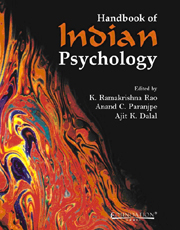Book contents
- Frontmatter
- Contents
- Contributing Authors
- Preface
- 01 Prologue: Introducing Indian Psychology
- 02 Indian Thought and Tradition: A Psychohistorical Perspective
- PART I SYSTEMS AND SCHOOLS
- PART II TOPICS AND THEMES
- PART III APPLICATIONS AND IMPLICATIONS
- 24 Therapeutic Psychology and Indian Yoga
- 25 Towards an Indian Organizational Psychology
- 26 Research on Indian Concepts of Psychology: Major Challenges and Perspectives for Future Action
- 27 Meditative Traditions and Contemporary Psychology
- 28 Consciousness Evolution of the Buddha until He Attained Satori
- 29 William James on Pure Experience and Samādhi in Sāṃkhya Yoga
- 30 Sri Ramaṇa Maharshi: A Case Study in Self-Realization
- 31 Altered States of Consciousness and the Spiritual Traditions: The Proposal for the Creation of State-Specific Sciences
- Pronunciation and Transliteration of Sanskrit Alphabet
- Glossary
- Index
27 - Meditative Traditions and Contemporary Psychology
from PART III - APPLICATIONS AND IMPLICATIONS
Published online by Cambridge University Press: 26 October 2011
- Frontmatter
- Contents
- Contributing Authors
- Preface
- 01 Prologue: Introducing Indian Psychology
- 02 Indian Thought and Tradition: A Psychohistorical Perspective
- PART I SYSTEMS AND SCHOOLS
- PART II TOPICS AND THEMES
- PART III APPLICATIONS AND IMPLICATIONS
- 24 Therapeutic Psychology and Indian Yoga
- 25 Towards an Indian Organizational Psychology
- 26 Research on Indian Concepts of Psychology: Major Challenges and Perspectives for Future Action
- 27 Meditative Traditions and Contemporary Psychology
- 28 Consciousness Evolution of the Buddha until He Attained Satori
- 29 William James on Pure Experience and Samādhi in Sāṃkhya Yoga
- 30 Sri Ramaṇa Maharshi: A Case Study in Self-Realization
- 31 Altered States of Consciousness and the Spiritual Traditions: The Proposal for the Creation of State-Specific Sciences
- Pronunciation and Transliteration of Sanskrit Alphabet
- Glossary
- Index
Summary
Indian psychology has a rich history of meditative and related practises. In fact, most of the contemporary interest in the psychology of meditative practice in the West can be traced back to Hindu-based mantra meditations or to the multitude of Buddhist meditative practises, which have many of their roots in India (Goleman, 1988). Common elements of meditative practice, such as cultivating focused attention and detached awareness, appear to contribute to psychological well-being and spiritual experience across traditions. Indian traditions of yoga and meditation have had an impact on psychological theory and approaches to psychotherapy beginning from the earliest development of contemporary psychology, influencing William James in the US, and Carl Jung in Germany. Interest in meditation influenced the development of humanistic psychology in the United States in the middle of the twentieth century, psychodynamic theory in the 1950s (Fromm, Suzuki and DeMartino, 1960), transpersonal psychology in the 1960s (Naranjo and Ornstein, 1971; Tart, 1969), and cognitive behavioural therapy in the 1970s (Benson, 1975; Carrington, 1977, 1998).
Meditation practices first entered Western psychology via India, initially through Europe, influencing both the transcendentalists and early models of hypnosis. Carl Jung was fascinated by meditation, although he viewed them as practices more appropriate for the “oriental mind” (Clarke, 1994). In Europe, Schultz (1934) drew explicitly on yogic meditative traditions to develop autogenic training, one of the earliest relaxation interventions still widely used to treat anxiety and stress symptoms. Progressive muscle relaxation (Jacobson, 1971) bears strong resemblance to certain yogic practises that cultivate mindful awareness of the experiences associated with alternating tensing and relaxing in the muscles throughout the body.
- Type
- Chapter
- Information
- Handbook of Indian Psychology , pp. 506 - 538Publisher: Foundation BooksPrint publication year: 2008
- 6
- Cited by



